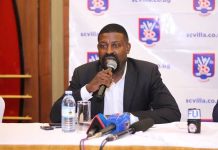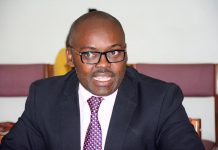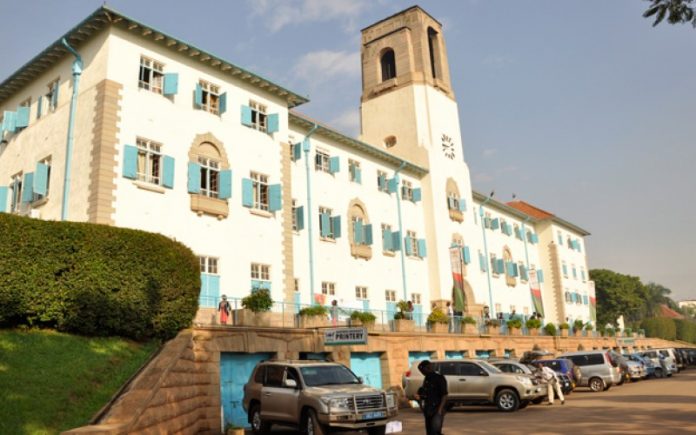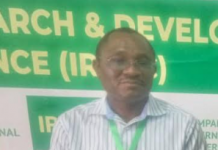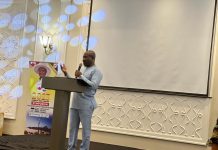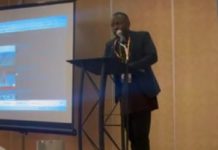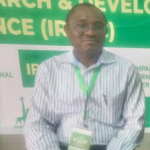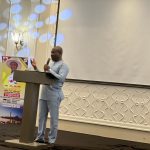Dr. Dickson Kanakulya, a lecturer of Philosophy and Human Rights in the College of Humanities and Social Sciences at Makerere University, is under fire for assigning a student to teach his colleagues for an entire month.
At least more than 200 students due for graduation next year are affected because of this anomaly.
A university probe team assigned to investigate the matter found Dr. Kanakulya in breach of the university rules, regulations and procedures.
The team has recommended that Dr. Kanakulya be referred to the university Appointments Board for Disciplinary Action.
It all started after Dr Patrick Mangeni Wa’Ndeda, the dean of School of Liberals and Performing Arts received a petition from three students on the day program of Bachelor of Ethics and Human Rights on April 25, 2019.
The students complained about the teaching and assessment of EHR31012 [Critical Thinking], a course unit taught during semester one of the 2018/2019 academic year.
In their petition, students raised concerns regarding the management of the course unit and the conduct of the lecturer towards their complaints. Subsequently, the school’s heads of department meeting held on June 17, 2019, decided to constitute a committee to investigate the matter to find a solution to the students’ complaints and other related issues.
The committee that was constituted on June 19, 2019, was required to conclude its investigations by July 7, 2019. The probe team was tasked to establish whether the concerned lecturer under-taught and to what extent, whether he breached examination and course rules, as well as ascertaining whether the lecturer displaced himself with his undergraduate student in respect of lecturing.
The probe team was led by Associate Prof Julius Kikooma and Dr Florence Nansubuga, both from the School of Psychology. The others members were Associate Prof Paul Omach from School of Social Sciences, Dr Florence Kyoheirwe Muhanguzi from the School of Women and Gender Studies, Esther Kabinga, a legal officer with the Legal directorate in the university and Vincent Ekwang, the college registrar.
During the investigations, the probe team studied documents provided by the office of the dean of School of Liberal and Performing Arts, interviews about the complaints and listened to testimonies of the witnesses who were mentioned in the various documents as well as Dr Dickson Kanakulya, who was assigned to teach the course.
Students testify against lecturer
William Ssekannyo, one of the affected students, said he has just completed the Bachelor of Ethics and Human Rights course on day program. According to Ssekannyo, the teaching was not uniform with that of the evening class. He disclosed to the probe team that Dr Kanakulya came to lecture not more than five times for the day class in the entire semester.
“Instead he would send an evening student, Ms Irene Nakibirige to lecture,” Ssekannyo disclosed.
He disclosed that Nakibirige taught them very many times because as the day class, they went over a month without the lecturer coming. He also told the probe that they never had a course outline for the said course unit.
Prossy Bameka, another student on the day program testified that they were not taught but the lecturer sent a student to teach them.
“Irene [the student] taught us for about two (2) weeks, twice every week and I attended lecturers about ten times the whole semester,” Bameka disclosed.
According to her, students in her program were asked to pay Shs 5000 each to attend and watch a compulsory documentary.
“The money was collected by external people who had organised the movie. However, some students never watched the movie because they never had the money, for example, Ntono Victoria didn’t watch,” she said.
Bameka further discloses that the lecturer generally was not available for students.
“We went on a trip to Jinja and Mukono and paid Shs 40,000 for the trip but he just took us to eat and dance,” she disclosed.
Robert Mutebi, another student disclosed that the course was taught by Kanakulya together with an evening student, Irene Nakibirige who came to teach them during the sessions in Livingstone Hall. The students say the lecturer only gave them one test towards the end of the semester yet the course work results sheet displayed on the noticeboard possessed three columns for course works.
They say the basis for awarding marks was not certain since they were not adequately taught.
“I wonder where other marks came from,” Mutebi disclosed to the probe committee.
Adding that “There was a student who was caught cheating in the test but she had even higher marks when the results came. When the invigilator caught her, her script was torn. A number of students witnessed this incident.”
Students also say during the end of semester examinations, answer booklets were provided and section A was structured and students were required to write their names and registration numbers. But for section B, the students were only asked to write their students numbers, which was surprising.
Pius Tenywa, an evening student of Bachelor of Ethics and Human Rights, says he was contacted one early morning by a classmate Angella Tendo informing him Dr Kanakulya wanted somebody to teach the day class.
Tenywa, who is awaiting his graduation, next year, said he attended a few of Kanakulya’s lectures and missed others due to personal reasons. He told the probe committee that he was the first to be called for the teaching offer but declined since he didn’t think he was ready.
“I suggested another student, Irene Nakibirige because she had the confidence. I am not sure if Irene was given transport money but she taught for about three weeks,” Tenywa told the probe committee.
Tenywa told the probe team that he also believed that some students in their class were being favoured by the lecturer.
“One time I needed to see Dr Kanakulya and Angella Tendo volunteered to take me because she said they were friends. There is also Anyango Patience who never sat for the test but she had the marks. I also heard that Anyango was caught cheating during their coursework test. She could not have done a special test so where did she get the marks from?” Tenywa wondered.
Tenywa implored the university top management to investigate Kanakulya on matters of teaching, assessment and awarding marks in critical thinking as well as the head of department for threatening students for raising complaints against the lecturer.
He alleged that the head of department [Dr Kasozi] called a meeting with the students subsequent to their complaints and threatened them. According to this student, Kasozi said “we need to nullify what we wrote and need to know that we are students.”
He observes that Innocent Byegarazo and others who signed the letter distancing themselves from the first petition is friends with Kanakulya. He said they received threats from the lecturer and the head of department that they wouldn’t graduate if they didn’t nullify the first letter.
Nakibirige confesses teaching colleagues
Nakibirige was invited to testify in the matter since she is at the centre of the investigations. She said although she could not verify some of the complaints against the lecturer were true, she told the probe one Monday morning at about 7:00 am, she received a phone call from a classmate called Tendo Angella who informed her she had just called about two evening students including Tenywa Pius and Innocent Byagarazo who had disappointed her.
She reportedly said Kanakulya had requested her to look for someone among the evening class to help teach the day class Critical Thinking.
“At first I rejected the request because I was afraid as I wasn’t prepared but later, I accepted since I was helping my fellow students,” Nakibirige disclosed.
The evening class was ahead of the day class by about four topics. The student thought this as a good chance to interact with fellow students and would be benefiting through the class discussions.
“I prepared myself that morning and about 9:00 am went to Livingstone Hall and taught the students,” she said.
All this happened the first semester of the academic year 2018/2019 between August and December. The student confessed to having used her class notes and personal research, especially from internet [Google] to teach the day class.
A few days after the first lecture, Kanakulya is said to have called her thanking her for helping him. The lecturer allegedly asked if there was anything he could do or give her to repay her, but she refused, saying she had taught in good faith.
She would later lecture a few more times about four double shift lectures in total, for about a month. Nakibirige says she never met the lecturer to discuss any reward but was shocked by the 10 marks she got in her coursework.
The student claimed she was very active in class but was not sure how she scored the marks as students have never received feedback about their performance. She says students have no idea how the coursework was assessed.
“I discussed my discontentment of my Critical Thinking marks with a lecturer Dr Lajul who advised me to appeal if I was not contented. I was helping the lecturer to teach day class and I don’t know how I scored low marks yet the lecturer trusted me enough to teach,” Nakibirige.
Head of department speaks out
Dr Kasozi F. Mutaawe, the head of Philosophy Department discloses that during the academic year in question, Kanakulya was the most suitable person to teach the course since Dr John Barugahare was on study leave.
He told the probe committee that the head of department always monitors teaching in the department both formal and informally and that he achieves this through interacting with the lecturers.
He disclosed that he had never received any complaints from the students regarding Critical Thinking EHR3102 during the semester. However, he says there were complaints in semester 2 in April 2019, yet this was a semester one paper. He says he convened a meeting with students at first when they attempted an industrial action.
He informed the committee that in the examination of Critical Thinking, students were required to write their names on the answer sheet, which he said was a practice in the department. According to the audit report, “The head of department expressed disappointment with the establishment of the committee. If he had the powers, he would have disbanded the committee.”
To Kasozi, the establishment of the committee was a sign of anti-intellectualism and hatred for academics.
“He initially objected to the formation of the committee as considered it unfair to the teaching staff. ‘Should they investigate students who miss lectures?’ he wondered,” reads in part the report.
Kasozi allegedly told the probe committee that the department should have been allowed to solve the problem internally other than being hijacked especially for students who do not want to learn.
According to the report, the head of department had heard about a student who conducted lectures on behalf of Kanakulya during the first meeting with the students but noted students had not complained to him.
“I come from a very good academic background. I would not have allowed it. I have a personal relationship with my teachers, there is none of them that I fear even those who have been there longer than me, so to get a complaint from a student and letting the lecturer know about it has not been my problem,” Dr Kasozi told the probe team.
He also disclosed that there were no field trips regarding the Critical Thinking course citing that he only heard about it when it had happened.
Kanakulya defends self
The lecturer told the committee that since the course had initial problems, he decided to change the teaching approach to experimental learning, which he thought would work. He says the course was similar to logic, which is mathematical and required students with a background of mathematics. He says he applied group work methods.
According to Kanakulya, he couldn’t share a course outline with the students since he was still developing it before releasing it. The probe report notes that the lecturer didn’t roll call nor provide attendance lists where students would write their names. He told the committee that he never recorded attendance because only half of the students would attend.
He further disclosed that he only missed three weeks when the class had challenges of lecture rooms. According to Kanakulya, he taught the course alone and only gave students practical work through peer learning, which was conducted by identifying students who showed more interest in the course.
He denied allegations of having sent a student from the evening programme to deliver lectures on his behalf to the day class. The lecturer also told the probe committee that he was not aware of any student who was caught cheating and her paper torn in the test and that course work results were displayed by the head of department. He also refuted claims that he favoured some students.
Committee verdict
The probe committee discovered that the lecturer hadn’t taught more than five lectures to the day class for the entire semester. The committee discovered that the number of lecture time given to students on the day programme was far below the recommended 45 lecture hours required under the semester system.
On coursework assessment, students who interacted with the committee raised concern about the basis on which, the concerned lecturer made coursework assessment and awarded marks to students. The probe found the lecturer in breach of university academic rules provided for under the 5th Edition of the Prospectus 2007/2010.
“Given that no course outline was provided, the plan for coursework assignments/tests was supposed to be administered for the final grading of the course. This was a breach of the General Academic/ Examination Regulations No. 1.0 on Course Work Assignments,” read the probe findings.
The probe committee also established that the concerned staff supplied examination question paper, which also served as answer booklet for section A of the examination in which students were required to write their names on the question/ answer booklet in contravention of examination rules that clearly state “Do not write your name anywhere in the answer booklet hence only your student’s number and Registration number should be written on the answer book.”
The committee noted that subjecting students to the same examination for which they didn’t receive similar content and instruction was unfair. The committee had also a burden to ascertain whether the concerned member of staff displaced himself with his undergraduate students in respect of lecturing.
The report notes that all the students the committee interacted with confirmed that Ms Irene Nakibirige, an undergraduate student from the evening programme (EHR3102: Critical Thinking) delivered lectures to the day class. Nakibirige also testified having taught for about one month and that she was sent by the concerned staff.
Story by URN



